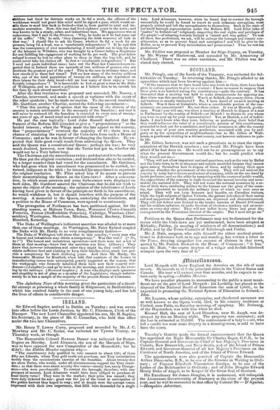SCOTLAND.
Mr. Pringle, one of the Lords of the Treasury, was reelected for Sel- kirkshire on Tuesday. In returning thanks, Mr. Pringle alluded to an opposition which had been brewing against him— "if the rumours that we have heard have any truth in them, there have been plots in certain quarters to give us a contest : I have no reason to suppose that these plots were hatched among the constituency—quite the contrary. It has transpired that a meeting was held to make arrangements for opposing me. But where was this meeting held ? Was it at Selkirk, the county-town, where our business is usually transacted ? No, I have beard of no such meeting at Selkirk. Was it then at Galashiels, where s considerable portion of the con- stituency are concentrated ? No, not there either. It was at Hawick, gentle- men. What ! you will say, was there a meeting at Hawick to dispose of a Beat in Parliament for the county of Selkirk—at Hawick! to dictate to you whom you were to send up for your representative ? Yes, at Hawick, a set of indivi- duals, I don't know who they were, believing or professing their belief that they could influence the votes of a considerable portion of this constituency, proceeded to look out for a candidate, and had the assurance to offer the county —not to any of your own country gentlemen, associated with you by pro- perty or by the sympathies of neighbourhood—but to Mr. Gillon of Wall- house, a gentleman residing in a distant county, not however unknown to pub- lic life.
Mr. Gillon, however, was not such a greenhorn as to trust the repre- sentations of the Hawick conclave ; nor would Mr. Pringle have been afraid if he had done so. He would not be so presumptuous as to say what the present Government would do ; but he could predict what they would not do- " They will not allow important national questions, such as the vote by Ballot and the Corn-laws, to lie in abeyance and remain unsettled because they cannot agree among themselves how to dispose of them, and by making them open questions abandon the government of the country. They will not mislead the country by noisy but insincere professions of economy, while on the one hand by lavish profusion, and on the other by tampering with the sources of public wealth, the expenditure of the country is made to exceed the annual revenue and accu- mulate the national debt. They will not waste the national resources by a se- ries of little wars, conducing neither to the honour nor the glory of the coun- try, but calculated to tarnish the military fame of which we were once so proud. They will not heap honours and benefits on Canadian traitors, while the loyal subjects of Queen Victoria, the gallant defenders of their native soil and supporters of British connexion, are depressed and discountenanced. They will not deliver over Ireland to the tender mercies of Daniel O'Connell and his reckless agitators, to make freedom of election a mockery and assassin- ation an every-day crime. They will not inflict heavy blows and great dis- couragement on the Protestant interest of the empire. But I need not go on."
Petitions to the Queen that Parliament may not be dismissed for the recess while the Corn-laws are yet undiscussed, have been adopted at Kirkaldy, Paisley, (a meeting of ministers of all denominations,) and Forfar, and by the Town-Councils of Edinburgh and Forfar.
Mr. J. Muir, surgeon, who calls himself the oldest medical practi- tioner in Johnstone both as to age and standing, has written a letter to the Tunes, denying altogether the account of distress in that town, quoted by Mr. Patrick Stewart in the House of Commons : "it has," says Mr. Muir, "the coarse impress of a vulgar and foolish falsehood stamped upon the very face of it."


























 Previous page
Previous page